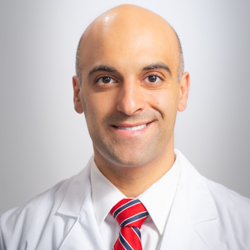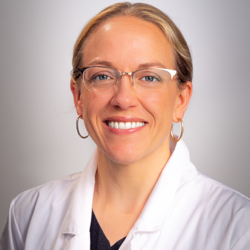A new clinical trial at The University of New Mexico Comprehensive Cancer Center may help people who have rare cancer mutations and enable them to receive personalized cancer therapy.
The Targeted Agent and Profiling Utilization Registry (TAPURTM) Study is sponsored by the American Society of Clinical Oncology (ASCO). It matches drugs that target specific cancer mutations to people whose cancers have those mutations, regardless of where their cancers appear or what type of cancer they have.
“The trial is cancer agnostic,” says Bernard Tawfik, MD, a medical oncologist at the UNM Comprehensive Cancer Center and one of the clinical trial’s physician leaders. “So it doesn’t matter what type of cancer you have, just what type of mutation.”

The trial is cancer agnostic. So it doesn’t matter what type of cancer you have, just what type of mutation.
Mutations are changes in a cell’s DNA that can interfere with how the cell normally functions. Cancer arises when enough mutations accumulate and the cell grows and multiplies uncontrollably. Targeted drugs interfere with the effects of specific mutations to stop cancer cells from growing and reproducing.
People with the same type of cancer often have the same mutations, and their cancers respond to the same treatments. But other people with that cancer do not respond because their cancer cells have a different set of mutations.
Medical oncologists like Tawfik must decide whether to give a targeted drug to someone who has a specific mutation but in a cancer that arises in a different part of the body.
“There are situations,” Tawfik says, “in which targeting a mutation in a certain cancer doesn’t help, even though targeting that same mutation helps in a different cancer.”
Cancer drugs that have approval from the U.S. Food and Drug Administration (FDA) often have limits on their use for this reason. But conducting a clinical trial for every possible combination of mutation and cancer type is not feasible.
“Basket” clinical trials offer a more efficient way to test several drugs against several mutations and cancer types at the same time. Each “basket” pairs a therapy that is targeted to one mutation or set of mutations. Several baskets can be made available simultaneously and change as new mutations and new therapies are developed.
The ASCO-TAPUR study has defined more than 50 combination baskets of cancer types and FDA-approved drugs, so that people with rare mutations may get access to a potentially life-saving treatment. And the number of combinations varies: some are removed and others are added weekly.
Tawfik explains that changing the combinations helps to capture information about mutations that occur infrequently in some cancers. The different combinations also allow researchers to test more drugs more quickly.
Ursa Brown-Glaberman, MD, medical director for Clinical Research at UNM Cancer Center, says that this approach also helps to deliver precision medicine, because people on the basket clinical trial get a targeted therapy or an immune therapy that addresses the specific mutations that their cancer has.
But the ASCO-TAPUR study is not for everyone. People wanting to join the clinical trial must first exhaust their standard treatment options and then have their cancer cells genetically tested. If testing reveals a rare mutation, and if a therapy that addresses that mutation is available in the clinical trial, then that person may participate in the study.
In addition to UNM Cancer Center, the ASCO-TAPUR clinical trial is open at Presbyterian Kaseman Hospital, Presbyterian Rust Medical Center/Jorgensen Cancer Center, Lovelace Medical Center (Saint Joseph Square), and Memorial Medical Center, all members of the New Mexico Cancer Research Alliance.
“UNM is leading this effort,” Brown-Glaberman says, “but it has generated interest from our oncology partners from across the state through our alliance network. It truly is a statewide effort.”
About Ursa Brown-Glaberman, MD
Ursa Brown-Glaberman, MD, is an associate professor in the Department of Internal Medicine, Division of Hematology/Oncology, in the UNM School of Medicine. She serves as medical director for Clinical Research at UNM Comprehensive Cancer Center and leads the Breast and Gastrointestinal Clinical Working Groups. She specializes in treating breast and gastrointestinal cancers. She received the National Cancer Institute’s Cancer Clinical Investigator Team Leadership Award in 2017.
About Bernard Tawfik, MD
Bernard Tawfik, MD, is an assistant professor in the Department of Internal Medicine, Division of Hematology/Oncology, in the UNM School of Medicine. He leads the neuroendocrine tumor Theranostics multidisciplinary team at UNM Comprehensive Cancer Center and specializes in treating breast, gastrointestinal and skin cancers.
About the ASCO-TAPUR study
The Targeted Agent and Profiling Utilization Registry (TAPURTM) Study is a clinical trial for people with later-stage cancer, focused on whether specific targeted therapies can benefit more patients and lead to more personalized therapies. The TAPUR Study is open and enrolling at 186 clinical sites nationwide. Learn more at https://www.cancer.net/research-and-advocacy/clinical-trials/what-tapur-study
UNM Comprehensive Cancer Center
The University of New Mexico Comprehensive Cancer Center is the Official Cancer Center of New Mexico and the only National Cancer Institute-designated Cancer Center in a 500-mile radius.
Its more than 136 board-certified oncology specialty physicians include cancer surgeons in every specialty (abdominal, thoracic, bone and soft tissue, neurosurgery, genitourinary, gynecology, and head and neck cancers), adult and pediatric hematologists/medical oncologists, gynecologic oncologists, and radiation oncologists. They, along with more than 600 other cancer healthcare professionals (nurses, pharmacists, nutritionists, navigators, psychologists and social workers), provide treatment to 65% of New Mexico’s cancer patients from all across the state and partner with community health systems statewide to provide cancer care closer to home. They treated almost 15,000 patients in more than 100,000 ambulatory clinic visits in addition to in-patient hospitalizations at UNM Hospital.
A total of nearly 1,855 patients participated in cancer clinical trials testing new cancer treatments that include tests of novel cancer prevention strategies and cancer genome sequencing.
The more than 123 cancer research scientists affiliated with the UNMCCC were awarded $38.2 million in federal and private grants and contracts for cancer research projects. Since 2015, they have published nearly 1000 manuscripts, and promoting economic development, they filed 136 new patents and launched 10 new biotechnology start-up companies.
Finally, the physicians, scientists and staff have provided education and training experiences to more than 500 high school, undergraduate, graduate, and postdoctoral fellowship students in cancer research and cancer health care delivery.
